Related Research Articles

Jean Arthur was an American film and theater actress whose career began in silent films in the early 1920s and lasted until the early 1950s.

Charles John Holt, Jr. was an American motion picture actor who was prominent in both silent and sound movies, particularly Westerns.

Roy William Neill was an Irish-born American film director best known for producing and directing almost all of the Sherlock Holmes films starring Basil Rathbone and Nigel Bruce, made between 1943 and 1946 and released by Universal Pictures.
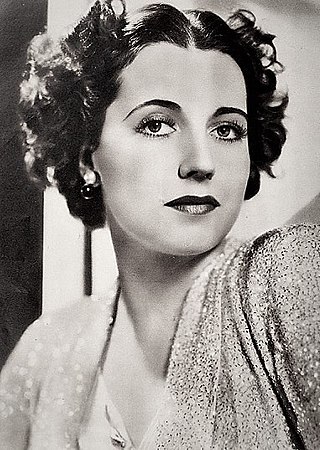
Mona Barrie was an English-born actress, active on stage in Australia before establishing a career in the US, and in Hollywood films.

Sandy Thomas is a fictional character from the British soap opera Emmerdale, played by Freddie Jones. Sandy was introduced as the father of Ashley Thomas. He made his first appearance during the episode broadcast on 6 November 2005. The character originally departed in March 2008, but returned to the show in February 2009. On 6 February 2018, it was confirmed that Jones had filmed his final episode and he made his final appearance as Sandy on 19 February 2018.

Florabel Muir was an American reporter, newspaper columnist and author. She became known for covering both Hollywood celebrities and underworld gangsters from the 1920s through the 1960s.

The Whole Town's Talking is a 1935 American comedy film starring Edward G. Robinson as a law-abiding man who bears a striking resemblance to a killer, with Jean Arthur as his love interest. It was directed by John Ford from a screenplay by Jo Swerling and Robert Riskin based on a story by W.R. Burnett originally published in Collier's in August 1932. Burnett was also the author of the source material for Robinson's screen break-through, Little Caesar. The film The Whole Town's Talking (1926) has no story connection to this film.
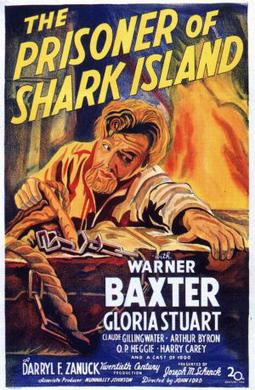
The Prisoner of Shark Island is a 1936 American drama film that presents a highly whitewashed and fictionalized life of Maryland physician Samuel Mudd, who treated the injured presidential assassin John Wilkes Booth and later spent time in prison after his unanimous conviction for being one of Booth's accomplices. The film was produced by Darryl F. Zanuck, was directed by John Ford and starred Warner Baxter and Gloria Stuart.

Willard Robertson was an American actor and writer. He appeared in more than 140 films from 1924 to 1948. He was born in Runnels, Texas and died in Hollywood, California.
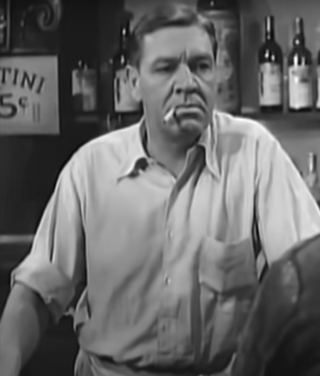
Max Wagner was a Mexican-born American film actor who specialized in playing small parts such as thugs, gangsters, sailors, henchmen, bodyguards, cab drivers and moving men, appearing more than 400 films in his career, most without receiving screen credit. In 1927, he was a leading witness in the well-publicized manslaughter trials of actor Paul Kelly and actress/screenwriter Dorothy Mackaye.

And One Was Beautiful is a 1940 American romantic drama film directed by Robert B. Sinclair and starring Robert Cummings, Laraine Day, and Jean Muir. It is based on the story of the same name by Alice Duer Miller. Two sisters are attracted to a rich playboy. One runs over and kills a man, and lets the playboy take the blame.

Broken Laws is a 1924 American silent drama film directed by Roy William Neill, remarkable for the appearance of Dorothy Davenport, who is billed as "Mrs. Wallace Reid".
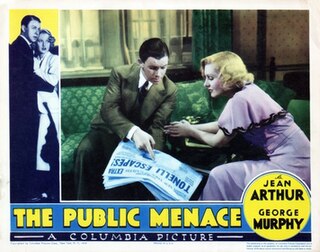
The Public Menace is a 1935 American black-and-white romantic drama film starring Jean Arthur, George Murphy and Douglass Dumbrille. A newspaper reporter keeps losing and regaining his job due to a manicurist he is persuaded to marry.

The Barker–Karpis Gang was one of the longest-lived criminal gangs during the Depression Era, spanning from 1931 to 1935. The gang was founded by Fred Barker and Alvin Karpis, and later joined by Fred's brother Arthur "Doc" Barker. Along with the three core members, the gang's network spanned up to 25 members at one point.

Aisling Tucker Moore-Reed, known by her pen name Tucker Reed, is a former amateur novelist who was convicted of manslaughter in May 2020. Reed co-authored the young adult novel Amber House published in October 2012 and its sequel Neverwas, released internationally in January 2014.

Mothers Cry is a 1930 American pre-Code drama film released by First National Pictures, a subsidiary of Warner Bros., and directed by Hobart Henley. The movie stars Dorothy Peterson, Helen Chandler, David Manners, Evalyn Knapp and Sidney Blackmer. The film is based on the popular novel of the same name written by Helen Grace Carlisle.
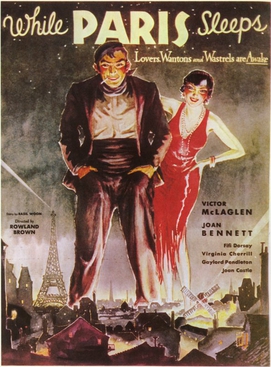
While Paris Sleeps is a 1932 American pre-Code drama film directed by Allan Dwan and starring Victor McLaglen, Helen Mack and Rita La Roy.

James Farley was an American character actor of the silent and sound film eras.

The Mark of Cain is a 1947 British drama film directed by Brian Desmond Hurst and starring Eric Portman, Sally Gray, Patrick Holt and Dermot Walsh. The film is based on the 1943 novel Airing in a Closed Carriage by Marjorie Bowen, which in turn was based on the true life murder trial of Florence Maybrick. It was made at Denham Studios with sets designed by the art director Alex Vetchinsky.

Conrad Henri Roy III was an American marine salvage captain who died by suicide at the age of 18. His girlfriend, 17-year-old Michelle Carter, had encouraged him in text messages to kill himself.